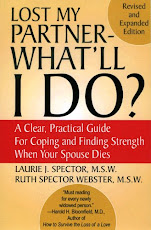
6/24/24
what widowers experience; part 2

The article by Dr. Micheal S. Caserta continues:
Emotional response
Similar to widows, bereaved husbands experience an array of emotions, such as anger, shock (especially if the death is unexpected), numbness, denial, and profound sadness. Unlike widows, however, grieving men tend to control their emotions (with the possible exception of anger), for instance, by holding back and crying less openly.
Widowers, more often than not, will channel their energy into active coping and problem-solving strategies like work, physical activity, or addressing disruptions in the household. At other times they may prefer to be alone with their thoughts, whether thinking about the circumstances surrounding their wife's death or reflecting on ways to cope with their new situation.
Widowers who experience the same emotions as widows but were raised with the belief that emotional control is a sign of strength often find themselves confronting an inner conflict about how to respond to a loss. The situation may instinctively call for a response that is emotional but the widower may not be socialized to express himself in that way. Adding to this confusion on the part of the widower is an assumption that there is only one way to grieve.
Men usually express their feelings of grief in solitary ways, but this should not be construed as being any less intense than a widow's grief. At the same time, to a varying degree, some widowers express their emotions more openly than others, suggesting that while some responses may be more typical, any one widower's experience can be somewhat unique as well.
Read more in Part 3.
Read complete article.
Subscribe to:
Post Comments (Atom)

No comments:
Post a Comment